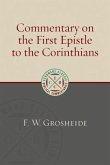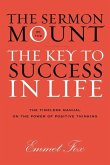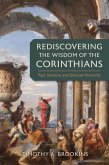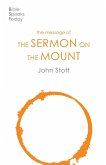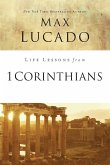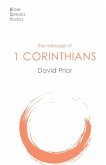Dr Christopher L. Carter
The Great Sermon Tradition as a Fiscal Framework in 1 Corinthians
Towards a Pauline Theology of Material Possessions
Dr Christopher L. Carter
The Great Sermon Tradition as a Fiscal Framework in 1 Corinthians
Towards a Pauline Theology of Material Possessions
- Broschiertes Buch
Andere Kunden interessierten sich auch für
![Commentary on the First Epistle to the Corinthians Commentary on the First Epistle to the Corinthians]() F. W. GrosheideCommentary on the First Epistle to the Corinthians41,99 €
F. W. GrosheideCommentary on the First Epistle to the Corinthians41,99 €![The Sermon on the Mount The Sermon on the Mount]() Emmet FoxThe Sermon on the Mount35,99 €
Emmet FoxThe Sermon on the Mount35,99 €![Rediscovering the Wisdom of the Corinthians Rediscovering the Wisdom of the Corinthians]() Timothy a BrookinsRediscovering the Wisdom of the Corinthians46,99 €
Timothy a BrookinsRediscovering the Wisdom of the Corinthians46,99 €![The Message of the Sermon on the Mount The Message of the Sermon on the Mount]() John StottThe Message of the Sermon on the Mount14,99 €
John StottThe Message of the Sermon on the Mount14,99 €![A Discussion Guide for Studies in the Sermon on the Mount by D. Martyn Lloyd-Jones A Discussion Guide for Studies in the Sermon on the Mount by D. Martyn Lloyd-Jones]() J D FlanaganA Discussion Guide for Studies in the Sermon on the Mount by D. Martyn Lloyd-Jones14,99 €
J D FlanaganA Discussion Guide for Studies in the Sermon on the Mount by D. Martyn Lloyd-Jones14,99 €![The Life Lessons from 1 Corinthians The Life Lessons from 1 Corinthians]() Max LucadoThe Life Lessons from 1 Corinthians14,99 €
Max LucadoThe Life Lessons from 1 Corinthians14,99 €![The Message of 1 Corinthians The Message of 1 Corinthians]() David PriorThe Message of 1 Corinthians16,99 €
David PriorThe Message of 1 Corinthians16,99 €-
-
Produktdetails
- The Library of New Testament Studies
- Verlag: Bloomsbury Publishing PLC
- Seitenzahl: 288
- Erscheinungstermin: 27. Juni 2019
- Englisch
- Abmessung: 205mm x 260mm x 15mm
- Gewicht: 444g
- ISBN-13: 9780567689290
- ISBN-10: 0567689298
- Artikelnr.: 54801663
- Herstellerkennzeichnung
- Libri GmbH
- Europaallee 1
- 36244 Bad Hersfeld
- gpsr@libri.de
Christopher L. Carter
Contents
Acknowledgments
Abbreviations
Chapter 1
Introduction
1 The Paul/Jesus Debate
2 Paul's Attitude towards Material Possessions
3 Objectives and Method
Chapter 2
The Authenticity of The Great Sermon Tradition
1 Ethics and Authenticity
2 Orality and Authenticity
3 Text and Authenticity
4 Conclusion
Chapter 3
Paul's General Interest in The Historical Jesus and His Specific Knowledge
of The Great Sermon Tradition
1 Inconclusive Indifference
2 Inconclusive Texts
3 Suggestive Circumstances
4 Suggestive Texts
5 Discipleship, Ethics, and The Great Sermon Tradition
6 Conclusion
Chapter 4
The Fiscal Worldview of the Great Sermons
1 Eschatology as a Hermeneutical Framework
2 An Otherworldly Perspective
3 The Ethical Implications of an Otherworldly Perspective
4 The Relational Priority of an Otherworldly Perspective
5 Impending Judgment
6 Conclusion
Chapter 5
1 Corinthians vis á vis the Great Sermon Tradition
1 Introductory Considerations
2 Eschatology as a hermeneutical framework
3 An otherworldly perspective
4 The Ethical Implications of an Otherworldly Perspective
5 The relational priority of an otherworldly perspective
6 Impending Judgment
7 Conclusion
Chapter 6
Paul and Jesus vis á vis Jewish and Greco-Roman Fiscal Thought
1 Fiscal Thought in Biblical Judaism
2 Fiscal Thought in Second Temple Judaism(s)
3 Fiscal Thought in the Greco-Roman World
4 Conclusions
5 Summary
Chapter 7
Conclusions and Further Refection
1 Paul's Theology of Material Possessions
2 The Source of Paul's Fiscal Thought
3 Further Reflection
Works Cited
Acknowledgments
Abbreviations
Chapter 1
Introduction
1 The Paul/Jesus Debate
2 Paul's Attitude towards Material Possessions
3 Objectives and Method
Chapter 2
The Authenticity of The Great Sermon Tradition
1 Ethics and Authenticity
2 Orality and Authenticity
3 Text and Authenticity
4 Conclusion
Chapter 3
Paul's General Interest in The Historical Jesus and His Specific Knowledge
of The Great Sermon Tradition
1 Inconclusive Indifference
2 Inconclusive Texts
3 Suggestive Circumstances
4 Suggestive Texts
5 Discipleship, Ethics, and The Great Sermon Tradition
6 Conclusion
Chapter 4
The Fiscal Worldview of the Great Sermons
1 Eschatology as a Hermeneutical Framework
2 An Otherworldly Perspective
3 The Ethical Implications of an Otherworldly Perspective
4 The Relational Priority of an Otherworldly Perspective
5 Impending Judgment
6 Conclusion
Chapter 5
1 Corinthians vis á vis the Great Sermon Tradition
1 Introductory Considerations
2 Eschatology as a hermeneutical framework
3 An otherworldly perspective
4 The Ethical Implications of an Otherworldly Perspective
5 The relational priority of an otherworldly perspective
6 Impending Judgment
7 Conclusion
Chapter 6
Paul and Jesus vis á vis Jewish and Greco-Roman Fiscal Thought
1 Fiscal Thought in Biblical Judaism
2 Fiscal Thought in Second Temple Judaism(s)
3 Fiscal Thought in the Greco-Roman World
4 Conclusions
5 Summary
Chapter 7
Conclusions and Further Refection
1 Paul's Theology of Material Possessions
2 The Source of Paul's Fiscal Thought
3 Further Reflection
Works Cited
Contents
Acknowledgments
Abbreviations
Chapter 1
Introduction
1 The Paul/Jesus Debate
2 Paul's Attitude towards Material Possessions
3 Objectives and Method
Chapter 2
The Authenticity of The Great Sermon Tradition
1 Ethics and Authenticity
2 Orality and Authenticity
3 Text and Authenticity
4 Conclusion
Chapter 3
Paul's General Interest in The Historical Jesus and His Specific Knowledge
of The Great Sermon Tradition
1 Inconclusive Indifference
2 Inconclusive Texts
3 Suggestive Circumstances
4 Suggestive Texts
5 Discipleship, Ethics, and The Great Sermon Tradition
6 Conclusion
Chapter 4
The Fiscal Worldview of the Great Sermons
1 Eschatology as a Hermeneutical Framework
2 An Otherworldly Perspective
3 The Ethical Implications of an Otherworldly Perspective
4 The Relational Priority of an Otherworldly Perspective
5 Impending Judgment
6 Conclusion
Chapter 5
1 Corinthians vis á vis the Great Sermon Tradition
1 Introductory Considerations
2 Eschatology as a hermeneutical framework
3 An otherworldly perspective
4 The Ethical Implications of an Otherworldly Perspective
5 The relational priority of an otherworldly perspective
6 Impending Judgment
7 Conclusion
Chapter 6
Paul and Jesus vis á vis Jewish and Greco-Roman Fiscal Thought
1 Fiscal Thought in Biblical Judaism
2 Fiscal Thought in Second Temple Judaism(s)
3 Fiscal Thought in the Greco-Roman World
4 Conclusions
5 Summary
Chapter 7
Conclusions and Further Refection
1 Paul's Theology of Material Possessions
2 The Source of Paul's Fiscal Thought
3 Further Reflection
Works Cited
Acknowledgments
Abbreviations
Chapter 1
Introduction
1 The Paul/Jesus Debate
2 Paul's Attitude towards Material Possessions
3 Objectives and Method
Chapter 2
The Authenticity of The Great Sermon Tradition
1 Ethics and Authenticity
2 Orality and Authenticity
3 Text and Authenticity
4 Conclusion
Chapter 3
Paul's General Interest in The Historical Jesus and His Specific Knowledge
of The Great Sermon Tradition
1 Inconclusive Indifference
2 Inconclusive Texts
3 Suggestive Circumstances
4 Suggestive Texts
5 Discipleship, Ethics, and The Great Sermon Tradition
6 Conclusion
Chapter 4
The Fiscal Worldview of the Great Sermons
1 Eschatology as a Hermeneutical Framework
2 An Otherworldly Perspective
3 The Ethical Implications of an Otherworldly Perspective
4 The Relational Priority of an Otherworldly Perspective
5 Impending Judgment
6 Conclusion
Chapter 5
1 Corinthians vis á vis the Great Sermon Tradition
1 Introductory Considerations
2 Eschatology as a hermeneutical framework
3 An otherworldly perspective
4 The Ethical Implications of an Otherworldly Perspective
5 The relational priority of an otherworldly perspective
6 Impending Judgment
7 Conclusion
Chapter 6
Paul and Jesus vis á vis Jewish and Greco-Roman Fiscal Thought
1 Fiscal Thought in Biblical Judaism
2 Fiscal Thought in Second Temple Judaism(s)
3 Fiscal Thought in the Greco-Roman World
4 Conclusions
5 Summary
Chapter 7
Conclusions and Further Refection
1 Paul's Theology of Material Possessions
2 The Source of Paul's Fiscal Thought
3 Further Reflection
Works Cited



